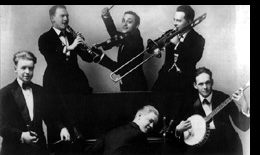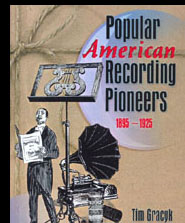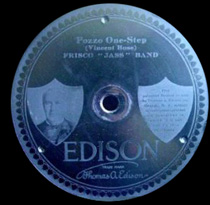 By Tim Gracyk
By Tim Gracyk
from the book "Popular American Recording Pioneers 1895 -1925." If you would like to order a copy of this book, click here for details.
In 1917 this band cut nine titles for Edison, all issued on Blue Amberol as
well as Diamond Disc. It was among the first to make records marketed as
"jass." Jaudas' Society Orchestra was the only Edison group to make an
earlier recording characterized as "jass."
The Frisco "Jass" Band was formed in early 1917 by Rudy Wiedoeft soon after
he arrived in New York City. According to the July 1917 issue of Edison
Amberola Monthly, the band "is now playing engagements at Montmartre, New
York's famous midnight cafe, the Winter Garden and the leading summer
resorts near New York." Presumably the word Frisco was chosen to reflect
that the musicians were from California. The band had no connection with
Edison xylophone artist and vaudevillian Lou Chiha Frisco.
 At its first session--on May 10, 1917--the Frisco "Jass" Band cut "Canary Cottage" and "Johnson's "Jass" Blues." In 1916-1917 Wiedoeft had played in
the pit for Oliver Morosco's production of Canary Cottage as the touring
show headed for the East Coast (it finally opened in New York City in the
Morosco Theatre on February 5, 1917). "Canary Cottage"--a medley of the
show's popular songs, written by Earl Carroll--was an obvious choice for the
band's first session. Announcing its August release, Edison promotional
literature characterized it as "a rattling One-Step melody from the tunes of
the musical show 'Canary Cottage,' played in typical 'Jass Band' style." No
cornet was featured, which was unusual for a "jass" ensemble at this time. At its first session--on May 10, 1917--the Frisco "Jass" Band cut "Canary Cottage" and "Johnson's "Jass" Blues." In 1916-1917 Wiedoeft had played in
the pit for Oliver Morosco's production of Canary Cottage as the touring
show headed for the East Coast (it finally opened in New York City in the
Morosco Theatre on February 5, 1917). "Canary Cottage"--a medley of the
show's popular songs, written by Earl Carroll--was an obvious choice for the
band's first session. Announcing its August release, Edison promotional
literature characterized it as "a rattling One-Step melody from the tunes of
the musical show 'Canary Cottage,' played in typical 'Jass Band' style." No
cornet was featured, which was unusual for a "jass" ensemble at this time.
"Johnson 'Jass' Blues" was issued first on Blue Amberol 3254 in September
1917, then a few months later on Diamond Disc 50470. It was named after the
song's composer, Arnold Johnson, who was also the band's pianist (beginning
in the early 1920s he made Brunswick records under his own name). By 1920
lyrics were added to Johnson's melody, and the song was transformed into the
popular "O," recorded by Billy Murray and others. The reverse side of
Diamond Disc 50470 features "Umbrellas To Mend," notable for a band member
shouting "umbrella!" at intervals and for remarkable percussion work.
 Additional titles include "Pozzo" and "That's It." Promotional literature
for "Night-Time In Little Italy," recorded on June 4, 1917, and issued as
Blue Amberol 3286 in October, states, "'Jazz' Bands are all the rage now.
This one is typical. The piece it plays is a very successful popular song,
given here in Fox-Trot rhythm."
Additional titles include "Pozzo" and "That's It." Promotional literature
for "Night-Time In Little Italy," recorded on June 4, 1917, and issued as
Blue Amberol 3286 in October, states, "'Jazz' Bands are all the rage now.
This one is typical. The piece it plays is a very successful popular song,
given here in Fox-Trot rhythm."
The November 1917 issue of Edison Amberola Monthly promoted the December
release of "Yah-De-Dah" on Blue Amberol 3337 by stating, "The utter abandon
displayed by a Jazz Band constitutes the greatest charm of this newest and
smartest addition to modern dance music." Other Edison promotional
literature added, "No players ever before played like this; hear them once
and the Frisco Jazz Band will have you fascinated for life. Incidentally
you'll fox-trot as never before to this music." (In late 1917 the company
dropped quote marks from the band's name and, like other record
manufacturers, switched from "Jass" to "Jazz.") "Yah-De-Dah" was recorded
on July 26, 1917, and issued on Blue Amberol months afterwards. It was
finally issued on Diamond Disc 51081 in December 1922. The reverse side
featured "All I Need Is Just A Girl Like You," which had been recorded by
the band on August 2, 1917.
If you would like to order a copy of "Popular American Recording Pioneers 1895 -1925" click here for details.
Thanks to Nancy Karan, Al Simmons and Dominic Combe for their help with the recordings on this page.
|
